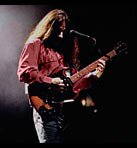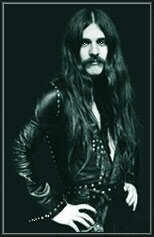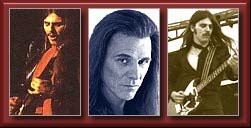
 |
|
by Scott "Dr. Music" Itter
|
rank Marino has been labeled by many, and mislabeled by even more. Known mostly for claiming that he was possessed by the ghostly spirit of Jimi Hendrix while being hospitalized for a drug interlude, this false stigma has haunted Marino throughout his entire career. Having never bought into the story, my interpretation of Frank Marino & Mahogany Rush music was always an impassioned one. Marino was always a primal guitar player to me; a player that took a song and just brutalized it with wicked licks of massive guitar fury. After growing up with Marino's version of the Chuck Berry classic, "Johnny B. Goode," from his "Frank Marino & Mahogany Rush Live" album, I find every other version of the tune hard to listen to, even to this very day. Intense and aggressive guitar music was something that I have craved for many years now, and Marino seems to be one of only a few players that can actually satisfy my appetite. He began recording his debut record, "Maxoom," in 1971 at the tender age of 16. It wasn't long after that that Marino started being recognized as one of the premier guitar players of the time. But, on this evening as I sat with Marino in his dressing room following a dynamic live set in Milwaukee, I discovered a man that was so much more than just a guitar player. As Marino offered me a stool and lit up a much needed smoke, he seemed like a comfortable man surrounded by all of the things that he cherishes in life; his family, his music, and his higher power&.not in that order. He confidently states, "My list of priorities goes like this God, family, music music is third on the list." Watching his beautiful family, wife Denise and their three daughters, contently passing the evening as any typical family might in the backstage lounge area, you got a full understanding of this man's life. With each daughter coming to embrace their father with the affectionate sound of "I love you Daddy," it was difficult to even focus on Marino's music. When I asked if he brings the kids with him everywhere he plays, he told me he wouldn't do it if he couldn't bring them along. As he told me more about his daughters, and the values he tries to instill within them ("honor, truth, Christ"), it was clear by their remarkable behavior that the message was getting through. Rarely have I seen such well-behaved and loving children as the ones I saw gathered around Frank Marino on this night. One of my first questions, even though it has worn out its welcome at this point, was about the "Hendrix story." What is the real Hendrix story? As Marino became defensive and bold, he bluntly said, "What story? There is no story." He still sounds angry as he tells me that a magazine made up the story and "the whole thing snowballed." Some magazines printed an accurate account of what Marino had said at the time. "I have print of the true story," he said. "This is what Frank Marino really said." "I explain the whole thing on the website," he said. When I asked how the Frank Marino of 2006 differs from the Frank Marino of 1976, it basically came down to one word - "freedom." He seemed elated to not be tied down by a major label. "I'm not chasing a career now. I'm much freer." When we started to talk about the 70's, the mood got somber. "I don't remember the 70's. I wasn't happy in the 70's. I never remember being happy in the 70's." It was at this point that I thought I would ask about what we might find Frank listening to as he goes from city to city, and the answer wasn't surprising. "I have my Doors, Quicksilver, The Beatles." Are there any new acts out there that appeal to you? "No," he said with little hesitation. He expressed to me that the artists that he just mentioned were enough for him, and he really saw no reason to seek out anything new. "I'm still living in 1968." He also told me that I might find him listening to Tony Bennett if he's the one driving. "I love Tony Bennett." With so many years of touring and playing live, I had to know what the most memorable moment in his career was. "Those early high school shows from '69 and '70." He told me that he loved the freedom, and the idea that he played whatever he wanted. "Money ruined music," he says. "I'm a 60's hippy. I still believe things should be free."
It was time to talk about the music of Frank Marino and his live performances. This is a man that has played to every size audience imaginable; from hundreds of thousands (California Jam 2) to your local smoke-filled taverns. Is it the big arenas or the small clubs that make Frank Marino feel more at home? "The small club," he says. "It's a lot easier to get sound right in the big arenas, because it's the same every time." A concept that I never gave too much thought to, but makes perfect sense. Every small club is a different shape and size, and therefore the sound demands adjusting from venue to venue. But, Marino was quick to tell me that he savors the intimate relationship with his fans that he gets with the small club setting. When we started to discuss playing live, there seemed to be a renewed twinkle in Marino's eyes. I was told by many that he has been playing three hour sets each night of the tour, so I decided to ask how he might go about choosing a setlist for such a lengthy performance. "There's never a setlist," he says. He told me how he has a list of basically every song he could possibly play at his feet. "I'll just look down during the set and choose one to play." And speaking of things at his feet& The custom pedal board that Marino uses was built entirely by the man himself. "I know about electronics, so I go to the schematics and build everything myself." Marino also stated emphatically that he considers himself a musician, not a guitarist. "Guys like Joe (Satriani) &and Steve (Vai), those guys are guitarists. They really play guitar. I'm a musician. I try to use the guitar as a tool to achieve many different sounds." As we began to get more comfortable in our conversation, I could see Marino was excited about something. He abruptly told me, "I'm a closet pop fan, too. I have 80 pop songs recorded all hook songs." And, although he was terribly excited to talk about his passion for these songs, he seemed to think that his audience would not welcome them. "I have to give the fans what they want, and they come to hear Mahogany Rush songs." Hearing Marino speak of his fans was like listening to a young child speak of a parent that they love and adore. His first priority when he goes onto a stage is to please his fans. When I assured him that the fans would appreciate hearing something new and different, he seemed to feel that he wasn't ready to take that chance quite yet. As he passionately told me of an acoustic folk song that he had just written as well, it was obvious that the creative juices were flowing for Marino. He informed me that his song, entitled "Pride Of A Man," had 13 verses, and was a social commentary. He said he had thought about playing it in his set earlier in the evening, but he just didn't think the fans would want to hear it. At that point, he asked someone in the lounge area if his acoustic guitar was nearby, and after a short trip to the van to unpack it, the acoustic was entering the room. As Marino began to play the song, I thought maybe this would be a good time to pinch myself. A rock legend that I have admired since I was a child was sitting in front of me playing a song that no other fan has heard. It was a moment that reminded me of how much I value life. Seeing his excitement with what he had achieved with "Pride Of A Man," I asked him what the best song he had ever written was. He simply said, "Probably that one, 'Pride of a Man.'" I decided to put Marino on the spot with some word association to end our session. He gave me extremely quick answers to the following items: Jimi Hendrix With eyes rolling and a slight smile, he says, "Trouble." Hall of Fame A big smile came over his face as he said, "Phony." He says, "I don't want to seem like a bitter guy." (Laughs) Fans "Lifeblood." Family "The world." Retirement He gave the surprising answer of "greatly wanted." As he started to explain he said, "I just can't." He continued, "People think I'm rich. (laughs) I still rent. We live a very modest life." He also added, "It's hard for me to go into a music store. They know it's me and the price goes up." When I asked what he might do with his time if he was to retire, he told me, "I would do the same thing. I would just play with my kids at home." So, what did I learn about my childhood guitar hero, Frank Marino, after spending almost an hour talking to him? Well&..he's not just a guitar hero but a musician, he was unhappy in the 70's, he loves Tony Bennett, he just turned 52 this past November (2006), and he is one of the most respectable human beings I've ever met. The love for his family, his fans, his music, and his God is truly remarkable. As we ended the interview he talked about flying to California for the next set of gigs. He expressed his fear of flying to me and nervously asked, "I'm gonna be okay, right?" I just laughed and said, "Yeah Frank, you're gonna be just fine." Extra special thanks to Frank & Denise Marino and their lovely family for giving me the opportunity to conduct this interview, and enriching my life with their beautiful spirit. Thank you. www.mahoganyrush.com |
|||


